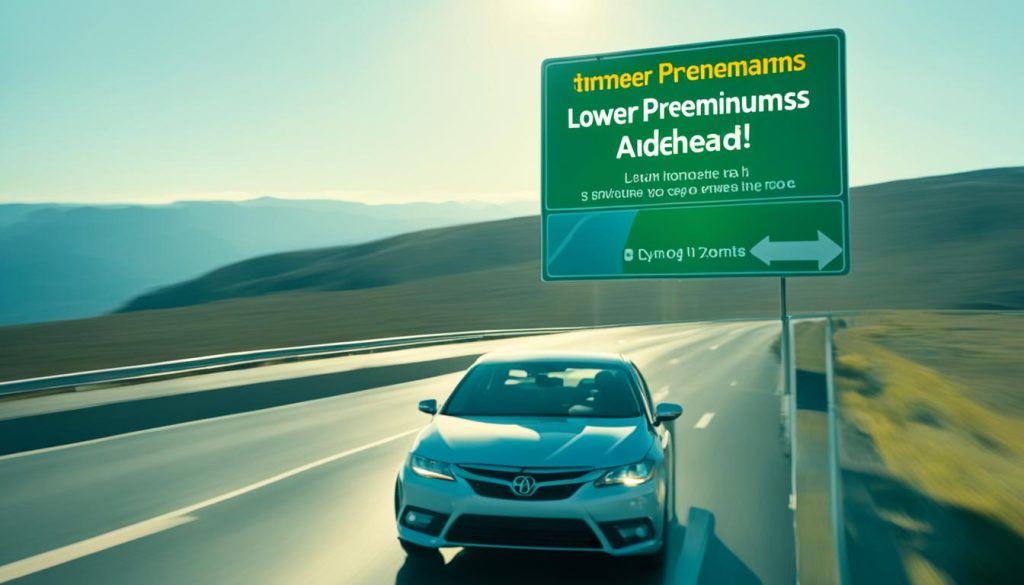Are you considering changing your car insurance provider? It’s a decision that could potentially save you money and ensure you have the right coverage for your needs. Whether you’re looking to lower costs or your car insurance needs have changed, it’s important to navigate the process of switching car insurance providers effectively.
In this article, we’ll provide you with a step-by-step guide on how to switch car insurance and help you determine the best time to make the switch. We’ll also explore the factors that determine car insurance costs and discuss when it’s worth switching providers. So, let’s dive in and discover how you can adapt your coverage by changing car insurance providers in Massachusetts.
Key Takeaways:
- Evaluating coverage options and considering life changes are key factors in deciding to switch car insurance providers.
- Shopping around for a new policy and comparing quotes can help you find the best insurance coverage for your needs.
- Switching car insurance can potentially save you money on premiums and offer better customer support.
- Factors such as accident forgiveness, types of discounts, and location can affect car insurance costs.
- Switching car insurance providers is a straightforward process, but it’s crucial to avoid a lapse in coverage and inform your leasing company about the switch.
How to switch car insurance
Switching car insurance companies is a pretty straightforward process, but there are some things to consider before you cancel your previous policy. To find the best deal on car insurance, it’s important to shop around and evaluate coverage options from different insurers. Start by getting quotes from multiple providers, so you can compare prices and coverage.
When evaluating each company, consider their reputability and services. Look for insurance companies with a strong track record and positive customer reviews. This will give you peace of mind knowing that you’re choosing a reliable provider.
Once you’ve decided on a new policy, it’s crucial to avoid a lapse in coverage. Apply for a new policy and make sure it is effective on the same day your old policy ends or is canceled. This way, you won’t have any gaps in your coverage, which could leave you financially vulnerable in case of an accident.
After obtaining the new policy, it’s time to cancel your old one. Contact your previous insurance company and inform them that you want to cancel your policy. It’s important to follow their specific cancellation procedures to ensure a smooth transition.
If you’re currently leasing a vehicle, it’s a good idea to let your leasing company know about your switch. They may have specific requirements or documentation that you need to provide to stay compliant with your lease agreement.
Lastly, it’s essential to review your new policy for any possible penalties or fees. Some insurance companies may charge a cancellation fee or have penalties if you cancel before the policy term ends. Make sure you understand all the terms and conditions of your new policy to avoid any surprises later on.
By following these steps and taking the time to evaluate different insurance providers, you can switch car insurance smoothly and confidently.
Expert Tip:
Remember to evaluate each company’s reputability and services, not just the price. A low-cost policy may not provide the coverage or customer service you need when you’re involved in an accident. Don’t make your decision based solely on price; weigh in other important factors too.
Is switching car insurance worth it?
Researching car insurance providers, comparing prices, and going through the process of switching companies can be time-consuming. You’ll also have to become acquainted with the details of your new policy and your insurer’s processes. With that in mind, make sure the new policy is worth the hassle.
If your main reason for switching insurance carriers is to save money on premiums, pay special attention to the types of discounts the new insurer offers and compare them to what you currently get. Saving money on premiums is a common incentive for switching car insurance. Look for insurers that provide various types of discounts such as safe driver discounts, multi-policy discounts, or student discounts.
A car insurance switch also makes sense if it leads to more policy options. For example, if you have concerns about premium increases due to accident claims, you could benefit from doing business with a company that offers accident forgiveness as a standard policy feature or an add-on option. Accident forgiveness allows you to avoid premium hikes after your first at-fault accident, saving you money in the long run.
Now, if what you’re looking for is better customer support, check your new insurer’s customer reviews and industry ratings to ensure it handles claims efficiently and provides reliable service. Customer support is crucial when it comes to insurance claims, as you want a responsive and helpful insurer that can assist you when you need it the most.
Payment options and online account management tools may also factor into your decision to switch. If you prefer convenient payment options such as automatic deductions or online bill payment, make sure your new insurer offers them. Additionally, having access to user-friendly online account management tools can make managing your policy easier and more efficient.
Overall, it’s important to carefully evaluate your reasons for switching car insurance and consider the potential benefits and drawbacks. By weighing factors such as potential cost savings, available discounts, policy options, customer support, and convenience, you can determine if switching car insurance is worth it for you.

How much does car insurance cost?
When it comes to car insurance, the cost can vary widely depending on various factors. These factors include your vehicle’s make, model, and features, as well as your age, gender, marital status, and location. Additionally, your accident and claims history, vehicle use and annual mileage, and the number and type of vehicles covered all play a part in determining your insurance premiums.
In order to get an accurate estimate of how much your car insurance will cost, it’s important to reach out to different insurance companies for personalized quotes. By doing so, you can compare prices and coverage options to find the best fit for your needs.
“The only way to get an exact figure is to reach out for personalized quotes from different insurance companies.”
For example, if you have a clean driving record with no accidents or claims, you may qualify for lower premiums. On the other hand, if you have a history of accidents or claims, your premiums may be higher. Similarly, the type of coverage you choose, such as liability-only or comprehensive coverage, will also impact your insurance costs.
The make, model, and features of your vehicle can also affect your premiums. Generally, more expensive or high-performance cars tend to have higher insurance costs. Additionally, factors such as the age and condition of your vehicle can impact your rates.

The Impact of Location
Your location can have a significant impact on your car insurance premiums. Urban areas with higher population densities and more traffic tend to have higher rates compared to rural areas. This is due to the increased risk of accidents, theft, and vandalism in urban settings.
Insurance companies also consider the local crime rates, as areas with high crime rates may result in higher premiums. Similarly, areas prone to natural disasters, such as hurricanes or tornadoes, may also have higher insurance costs.
It’s important to note that each insurance company may weigh these factors differently when determining your premiums. That’s why it’s essential to shop around and compare quotes to find the best car insurance coverage at a reasonable cost.
“The make, model, and features of your vehicle can also affect your premiums. Generally, more expensive or high-performance cars tend to have higher insurance costs.”
In Summary
As you can see, there are several factors that come into play when determining the cost of car insurance. Vehicle characteristics, driver history, location, and coverage options all contribute to the final premiums. To get an accurate estimate for your specific circumstances, it’s best to request personalized quotes from multiple insurers.
When to switch car insurance
Choosing the Best Time to Make a Change
You have the freedom to change your car insurance provider whenever you feel it is necessary. While most individuals switch insurers at the end of their policy term, it is also possible to switch in the middle of the term if circumstances require it.
Consider Multiple Factors
There are several reasons why people switch insurance companies, with rate increases being a significant determining factor. If your current insurer raises your rates or if you find a cheaper rate from another insurer, it may be worth considering a switch. However, it is important to note that attempting to make policy changes immediately after an accident and falsifying the date of the incident is considered insurance fraud, and it can lead to serious consequences, including a void policy and potential legal implications. It is advisable to wait until after the completion of the claim process before considering any policy changes.
Evaluating Coverage and Deductibles
When deciding to switch car insurance, it is crucial to assess your coverage limits and deductibles. Understanding your current policy’s coverage and comparing it to potential new policies can help ensure that you are getting the right level of protection for your needs.
Get Quotes and Compare
To make an informed decision, obtain quotes from multiple insurance providers and compare their offerings. This will help you gauge whether a new policy is worth the switch in terms of price and coverage. It is recommended to evaluate each company’s reputability and services by checking customer reviews and ratings.
Take Note of Policy Term and Life Changes
While the end of a policy term is a typical time to switch car insurance, it is important also to consider any significant life changes that may warrant a change in coverage. Life events such as getting married, buying a new car, or moving to a new state can impact your car insurance needs and potentially result in a better policy for your circumstances.
Switching car insurance providers can be a beneficial move, especially if it results in a cheaper rate, better coverage, or improved customer support. However, it is crucial to weigh the pros and cons, thoroughly evaluate coverage options, and consider factors such as the end of policy term and completion of the claim process before making a decision.

Conclusion
Switching car insurance companies can be a beneficial move if it helps you save money on premiums, provides better coverage options, or improves customer support. It’s important to thoroughly evaluate coverage options, consider the factors affecting insurance costs, and weigh the pros and cons before making a decision. By shopping around for a new policy and comparing quotes, you can find the best deal and the coverage that suits your needs.
When considering a car insurance switch, it’s essential to recon that life changes and circumstances can impact your insurance needs. Evaluating coverage options and finding the best deal involves understanding the types of discounts available and considering accident forgiveness as well as better customer support. Moreover, it’s crucial to factor in insurance costs, such as the factors that can affect premiums.
Knowing when to switch car insurance can also play a crucial role in making a smooth transition. Whether it’s at the end of a policy term or after completing the claim process, being aware of the right timing can help ensure a hassle-free switch. Ultimately, the goal is to protect your business with three key insurance plans and find the best insurance coverage for your needs.




No comments! Be the first commenter?